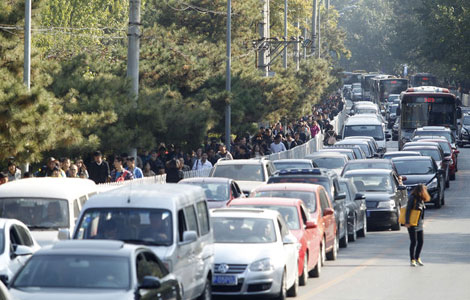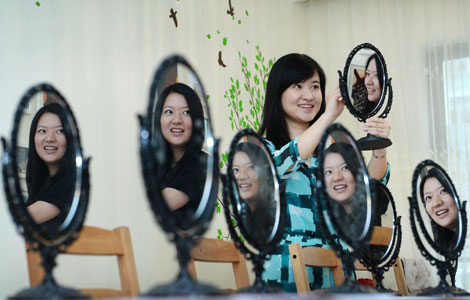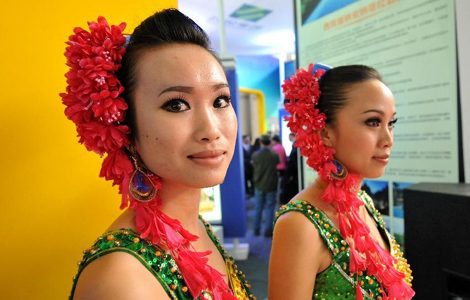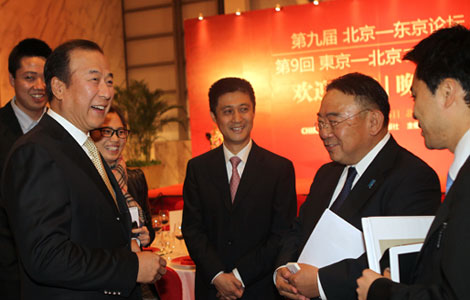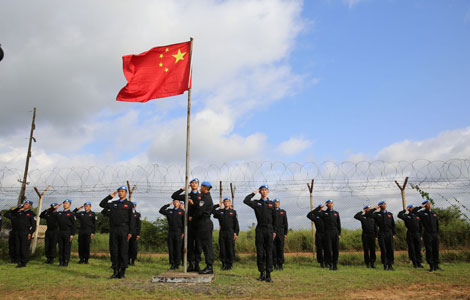

Editor's note: China-Japan relations have been stuck in a stalemate since September 2012. People with knowledge of the two countries are pooling their wisdom, trying to find solutions to the situation. China Daily Tokyo Bureau Chief Cai Hong interviewed Noboru Yamaguchi, professor of the National Defense Academy of Japan. He is a retired lieutenant general of Japan's ground self-defense force.
|
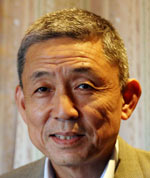 Noboru Yamaguchi, |
What do you think of the Beijing-Tokyo Forum as a means for China-Japan relations?
At the track two or track 1.5 meetings the academic and business people could be flexible in discussing issues. We could touch on the difficult ones such as the territorial and historical issues. We could be more flexible than the governments are. In such a circumstance, even government officials participating in the event could also be relaxed in the atmosphere. At the track two meetings, we could be more creative in order to improve the bilateral relationship.
Many Japanese parties plan to send their members to visit China in November. What is your comment about these visits?
I think they are important. The more communication we have with China, the better we will have the chance to improve bilateral relations.
The track one (dialogue) for diplomats, bureaucrats and military are key. At the track two we can come up with creative ideas.
Ten years ago we had more political channels for communication. I find very limited communication channels now. In this sense, I really welcome so many members of (Japanese) parties going to China.
So what kind of a solution should the two countries find to prevent the bilateral relations from having ups and downs?
My proposal is that academic and business people such as me working on the track two talk to each other because they share common values. They keep working hard to find out creative ideas. Once the atmosphere gets better, political leaders can come up with some ideas. We really need the timing or opportunity. Political leaders should really work hard to make that atmosphere better.
I see this fall or maybe next year the chance for a better atmosphere will come for the two countries to improve the relations, and they will build the foundation for future cooperation.
The problem in the past 12 or 14 months was that the incoming leaders could not be flexible because they didn't know how strong they were. So they had to talk to the domestic audience. That was the case last year. This year both countries can look outside. (Chinese) President Xi Jinping has led (his country) very successfully in terms of foreign policy. Japanese Prime Minister Abe is very active.
People have talked a lot about a rising China. What is your comment on the rise of China?
China's rise is a given fact even though we don't know how fast or how long it will keep rising. But in what direction China's rise will move or how long its stability will remain are not given.
If China cooperates with the United States and Japan economically, China may have more and better chances to keep the rise longer. The Sino-US relations have become very cooperative and friendly. If the relations between the US and China become tense, if not hostile, many countries will be worried about it. The price will be the Sino-Japan relations.
Under the Koizumi administration we created a mutually beneficial strategic relationship. We share common interests in terms of economy and security. It is not a zero-sum game. It must be a win-win situation. The lose-lose scenario is scary. In that case, if China and Japan can cooperate with each other, we can shape the future.
Are China and Japan partners or competitors?
There should be competition because we are living in a market economy. China and Japan can cooperate in the areas such as environment and energy saving.
There are gaps in trust and confidence building between China and Japan. Do you think the two can dispel their distrust?
For the last several years both Chinese and Japanese worked very hard to find a way to improve the crisis (management) communication between the navies and coast guards of the two countries.
We don't want to see any accidents break out. Before confidence is built between the two militaries, we have to avoid unnecessary, unexpected accidents. Then we can talk about confidence or promoting confidence in each other. China and Japan are working to create a confidence-building mechanism.
But as far as I know they don't have any conclusions about how to do it.
Japan is actively developing relations and cooperation with ASEAN members. Even Japanese analysts say Japan's intention is to check China's growth. What do you think?
Japan has what we call capacity-building (with ASEAN countries), particularly the coast guards. In the future, (Japan) will conduct peacekeeping operations or humanitarian assistance. China is too big to contain. Don't even think about it. Safety and peace in the South China Sea are in China's interests. That is exactly the common interest we share in that area.
There are multilateral frameworks such as ASEAN, ASEAN+3 and the Shanghai Cooperation Organization. But they are not necessarily mutually reinforcing. I personally welcome any kind of cooperation, such as with the US or European Union.
Japan and Russia decided to have a "two plus two" meeting for their foreign ministers and defense ministers in November, What is your comment on Japan-Russia relations?
It will the first "two plus two" meeting for Japan and Russia. Japan has very serious problems with Russia. Russia has become more active after being quiet for almost 10 years. Russia has become more visible in this region. We have to, at least, avoid any confrontations. At most, we should cooperate with each other.


